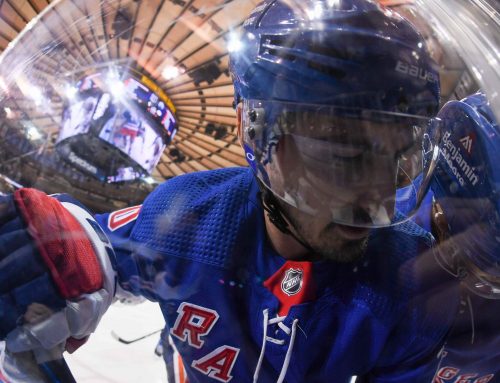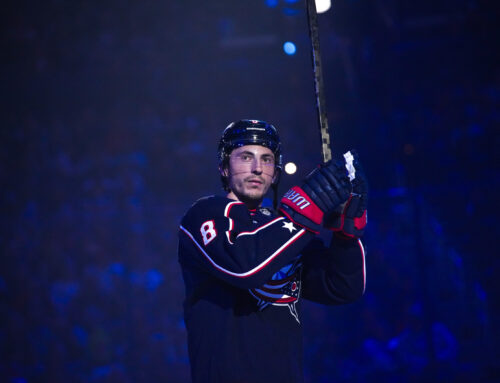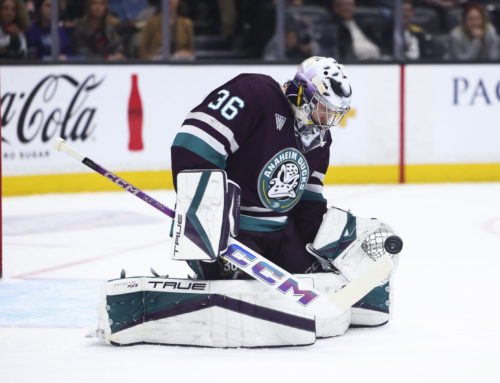A good read from Greg Wyshynski and Emily Kaplan over at ESPN about the NHL bubble. They got nine players to talk about the experience inside the bubble from both Toronto and Edmonton. This means talking about the food, entertainment, amenities, security, safety protocols, and everything else. It's… eye-opening.
The NHL got its security protocols right. It seems like the players agree on that, and from a perspective of finishing games and making people feel safe, this should be priority number one. It's nice to see the NHL got this right basically every step of the way.
But the NHL got almost everything else wrong. From lying about amenities, to over-selling on families joining, and a whole host of other issues. This seems problematic for a league that will need to guide its next regular season during this same pandemic, which will require cooperation and compromise from all sides on all issues. This is undoubtedly going to leave a bad taste in the players' mouths, and it'll be hard to feel that the owners aren't negotiating from a position of bad faith. They promised and failed to deliver on many things, or just outright lied about them. That's probably not going to make for a lot of trust and faith as we head into 2021.
The league got the safety right and deserve a lot of commendation for that. They got a lot else wrong and they have to fix it for next season, whatever next season looks like.
*
We are not going to have a lot of turnaround this off-season, at least not initially. This year's draft is scheduled for October 6th and 7th, and though a lot hasn't gone to plan this year, that's only a couple weeks away. Free agency starts two days after that. If this Cup Final goes to Game 7 – and honestly, after the first two games, it looks as if we're on the way – the first official day of the off-season will be October 1st. That's really not a lot of turnaround between the end of the regular season and the start of everything else. It's certainly less than we're used to.
But it feels weird, right? We just had four months of off-season. Then we had two months of hockey, now free agency and the draft are a week after that, then months of off-season again.
With that in mind, I want to take today's Ramblings to talk about impending free agency. Mostly, I'm using this to wildly guess about what teams might do or guess at where a couple players may land because I'm writing this on a Tuesday in late September during the Stanley Cup Finals and nothing really matters anymore.
Let's get a lay of the land first. Who has cap space to do anything? Most proceeding information will be from Cap Friendly.
Just a few notes:
- This is just summarizing cap space and contracts needed as of today. I'm not trying to predict who will clear cap space via trade, who will have an internal budget we don't know of, or who will be sent to Robidas Island. In a year of uncertainty, that extends to the NHL. Teams that ostensibly have $13 million in cap space may only have $7 million because of an internal cap, but if we don't know about it, we can't plan for it.
- There are some players included in cap hits that may not be with the team. In Montreal, for example, that includes Karl Alzner, as well as Sven Baertschi in Vancouver. Assuming they're both buried, that changes the equation a bit.
- I'm not including teams with less than $10 million in space as of today, or somewhere near that number with big contracts to hand out. There's no use in pointing out that Anaheim and Arizona are capped out, which they are, or that Boston has $14 million in space but with Torey Krug and Jake DeBrusk needing contracts.
All clear? Let's go.
Cap Space: who has any in a flat cap era?
Buffalo – They have well over $30 million in cap space heading into next year with only Sam Reinhart needing a significant chunk of change. I wrote about this not long ago, and shortly after posting that, we got word that they wouldn't be a cap team, rather coming in around $70 million. So, roughly $35M in space is now roughly $25M in space. I'll figure $6M for Reinhart on a long-term deal, and now the team has under $20M in internal space with half a team to sign. And that's how a franchise goes from loads of cap space to little without doing anything.
Calgary – I'll say this up front: I think the Flames are a dark horse for Alex Pietrangelo, if he wants to sign there. They have $17 million in space and need to replace a few of their blue liners, but don't have any major contracts to hand out. They also firmly believe they're in their Cup window.
Colorado – They have over $20 million in space and no monster contracts to sign. On the flipside, both Cale Makar and Gabriel Landeskog need new contracts after the 2020-21 season. My theory is that they sign Taylor Hall to run one year of Hall/Landeskog on the left side before letting Landeskog walk and have Hall take his place. It's just a theory I have in my head. Or maybe they don't and just decide to re-up their own players.
Dallas – They have $15 million in space but also need to re-sign Hintz and Gurianov, with Heiskanen likely a year away from a monster deal. I wouldn't expect a significant signing here but team-friendly bridges for Hintz/Gurianov could change things.
Detroit – They're in the same boat as Buffalo in that they have over $30 million in cap space, but they have two likely significant contracts to make in Tyler Bertuzzi and Anthony Mantha. I would watch for Detroit. They have a ton of space and, yes, a lot of players to sign, but they also have a lot of young players on cheap deals that have a shot of being in the lineup like Veleno, Zadina, Cholowski, and Seider. That would leave room for Detroit to make a splash, should they choose and should they convince someone to sign, and they have more bad money coming off the books after 2020-21.
Florida – In name, they have $20 million in space, but they also have Mike Hoffman and Evgenii Dadonov as UFAs and there's a new regime in charge. Heavens knows what's going to happen here, but they have two years left of Barkov's cheap deal, so I suggest getting in gear.
Los Angeles – The next two years in Los Angeles will be interesting. They have a prospect pool that may be the best in the NHL (including whomever they take at number-2 this year), but they have a lot of aging players. They also have Jeff Carter and Dustin Brown coming off the books in two years. The team has space ($17 million) and no big signings to make on their own roster. Do they try and make a push to get something out of what's left of Carter/Brown, or do they sit back and let Doughty/Kopitar get two years older before making a push? Not an easy decision.
Ottawa – They have about $40 million in cap space, but they also have Eugene Melnyk as the owner, so they really have about $20 million in cap space.
New Jersey – Over $25 million in cap space but they have to fill out 10 roster spots. They also have every single contract coming off the books in the next two years other than Nico Hischier and Damon Severson (and obviously the young guys on ELCs). Seems probable they just keep stockpiling before weaponizing that space, though eating bad contracts through the trade market seems more likely.
NY Rangers – In theory they have space, but they also have a lot of RFAs (five, in fact, including Georgiev for now). They are also two years away from contracts for Zibanejad, Kakko, and Fox. Seems more likely they're a trading team than a free agency team.
San Jose – Somehow, despite spending in excess of $25 million on three defencemen, they have $14 million in space with only a few lesser signings to make. They can make a splash if they want to try to extend their window. San Jose usually does something we don't expect.
Vancouver – They could have cap space if they let Jacob Markstrom and Chris Tanev walk. What they decide to do with those two players will decide if they can go out and add some good depth on the blue line/bottom-6 or not.
That's the landscape as of now. Remember that guys being buried or sent to Robidas Island will change things, but that's roughly where we stand today. I'll write more about this as the week proceeds because I have the next two Ramblings as well.
*
For more information on how the cap will affect your cap leagues or cap projections for players moving forward, be sure to check out our 'Capped' section from our own Alex MacLean. It has projections, increases, decreases, and everything else cap leaguers need to prepare for next season. He has an ongoing series moving along right now, which is a good start to the off-season.





 EDM
EDM FLA
FLA MIN
MIN NYR
NYR L.A
L.A DAL
DAL BUF
BUF CBJ
CBJ DET
DET CAR
CAR
